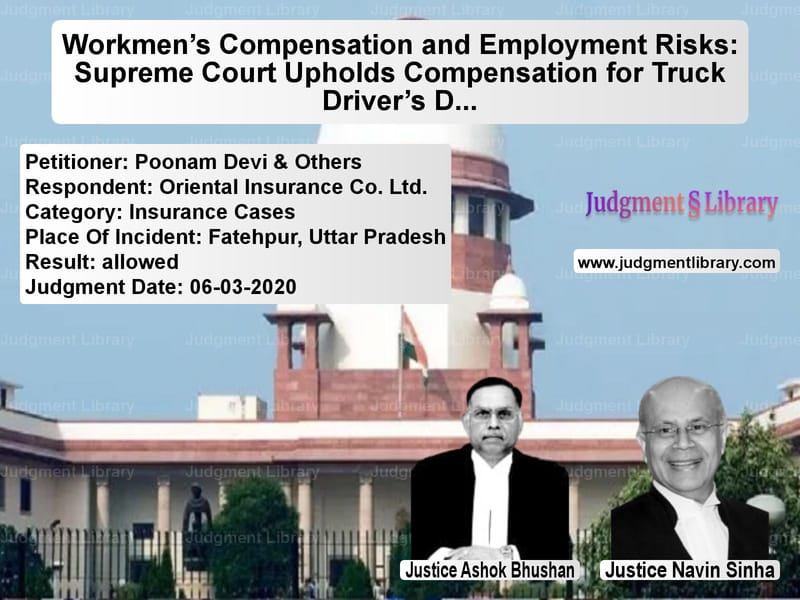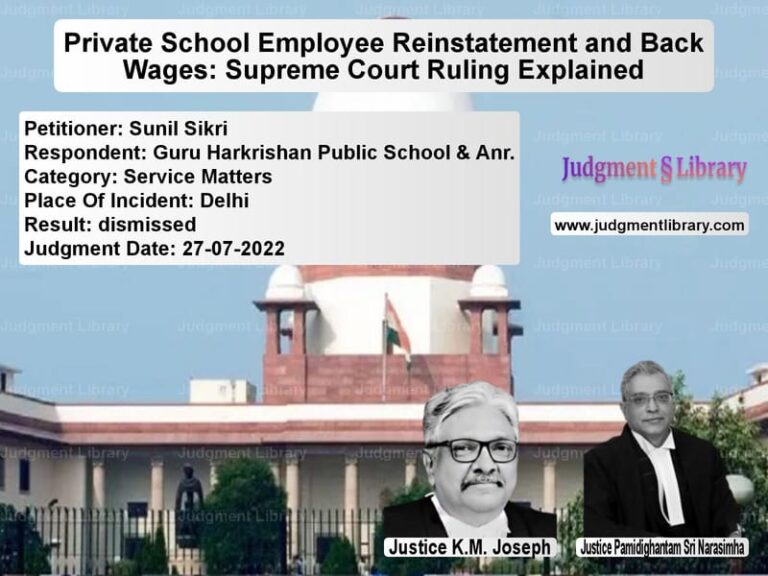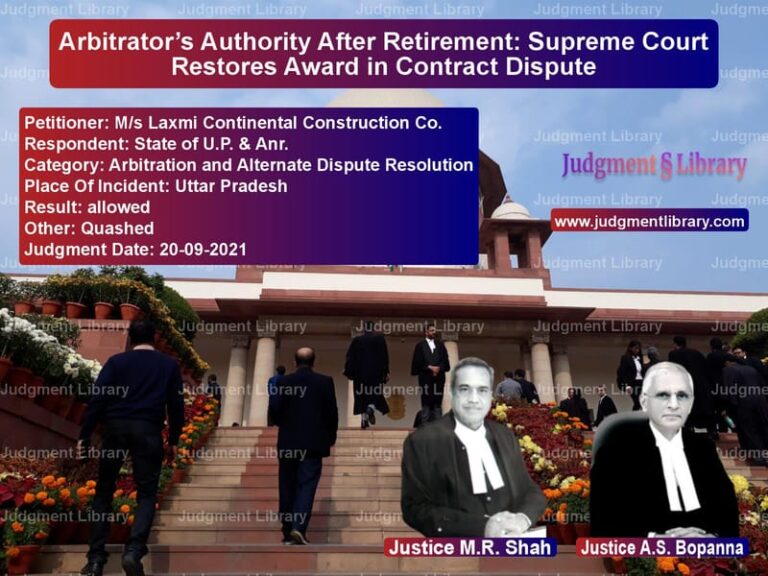Workmen’s Compensation and Employment Risks: Supreme Court Upholds Compensation for Truck Driver’s Death
The case of Poonam Devi & Others vs. Oriental Insurance Co. Ltd. revolves around a crucial legal question regarding the liability of an employer under the Workmen’s Compensation Act, 1923 (now Employees’ Compensation Act, 1923). The Supreme Court had to decide whether a truck driver’s accidental death while fetching water for personal use and vehicle cooling could be considered as arising out of employment.
Background of the Case
The deceased was a 21-year-old truck driver employed by the vehicle owner. On June 11, 2003, he was driving a Tata 407 truck from Ambala to Meerut, covering approximately 200 kilometers. At around 12:30 PM, while crossing a bridge near Fatehpur, he went to the Yamuna canal to fetch water and cool himself in the intense summer heat. Unfortunately, he slipped into the canal and drowned.
The Workmen’s Compensation Commissioner awarded compensation of Rs. 4,45,420/- to his legal heirs, with 12% interest from the date of the accident. Additionally, a penalty was imposed on the employer under Section 4A(3)(b) of the Workmen’s Compensation Act.
However, the High Court overturned this ruling on May 9, 2014, holding that the death occurred during employment but did not arise out of employment. The family of the deceased appealed against this decision in the Supreme Court.
Petitioners’ Arguments
The appellants, represented by Mr. Vikas Bhadana, contended that:
- The extreme heat on the day of the accident made it necessary for the driver to fetch water, both for personal relief and possibly for vehicle maintenance.
- The truck’s cabin was not air-conditioned, making it unbearably hot during peak summer.
- Keeping himself fresh and hydrated was essential for safe driving, making the act of fetching water incidental to employment.
- The notional extension of employment theory, as recognized in previous Supreme Court judgments, should apply in this case.
Respondent’s Arguments
The respondent, Oriental Insurance Company Ltd., represented by Mr. Ajay Singh, argued that:
- There was no causal connection between the death and employment.
- The driver had gone to fetch water for personal consumption, and bathing was not part of his employment duties.
- Under the principle established in Malikarjuna G. Hiremath vs. Branch Manager, Oriental Insurance Company Limited, (2009) 13 SCC 405, an accident must be incidental to employment to be compensable.
- The High Court rightly concluded that the act of going to the canal was at the worker’s own risk and not connected to his employment.
Supreme Court’s Observations
The Supreme Court examined the essential question: Did the death arise out of employment? The Court noted that for an accident to be compensable, it must occur “in the course of employment” and “arise out of employment.” The Court emphasized the doctrine of notional extension, which extends employment-related liability beyond workplace boundaries in certain cases.
The Court referred to previous judgments:
- B.E.S.T. Undertaking vs. Agnes (1964), which held that employment does not always end when work hours conclude and that employment-related risks may extend beyond strict workplace boundaries.
- Daya Kishan Joshi vs. Dynemech Systems Pvt. Ltd. (2018), which held that an accident occurring during fieldwork travel was related to employment.
- Leela Bai vs. Seema Chouhan (2019), where a bus driver staying at the bus stand for an early departure fell while descending from the bus roof, and the Court held that the act was incidental to employment.
Final Judgment
The Supreme Court ruled in favor of the appellants, holding:
“Every action of the driver to ensure the safety of the employer’s vehicle and himself for a smooth journey is incidental to employment. The act of fetching water and cooling himself was essential for safe driving and, therefore, related to employment.”
The Court reinstated the Workmen’s Compensation Commissioner’s order and directed the Insurance Company to make payments within six weeks.
Impact of the Judgment
This ruling strengthens the legal interpretation of employment-related risks:
- It broadens the scope of employer liability under workmen’s compensation laws.
- It reinforces the application of the notional extension doctrine in employment cases.
- It ensures better protection for employees who undertake essential but informal tasks during their job.
The judgment sets a precedent that employers and insurance companies cannot evade liability for accidents occurring due to reasonable actions taken by employees to maintain their working conditions.
Petitioner Name: Poonam Devi & Others.Respondent Name: Oriental Insurance Co. Ltd..Judgment By: Justice Ashok Bhushan, Justice Navin Sinha.Place Of Incident: Fatehpur, Uttar Pradesh.Judgment Date: 06-03-2020.
Don’t miss out on the full details! Download the complete judgment in PDF format below and gain valuable insights instantly!
Download Judgment: Poonam Devi & Others vs Oriental Insurance C Supreme Court of India Judgment Dated 06-03-2020.pdf
Direct Downlaod Judgment: Direct downlaod this Judgment
See all petitions in Compensation Disputes
See all petitions in Motor Insurance Settlements
See all petitions in Other Insurance Cases
See all petitions in Judgment by Ashok Bhushan
See all petitions in Judgment by Navin Sinha
See all petitions in allowed
See all petitions in supreme court of India judgments March 2020
See all petitions in 2020 judgments
See all posts in Insurance Cases Category
See all allowed petitions in Insurance Cases Category
See all Dismissed petitions in Insurance Cases Category
See all partially allowed petitions in Insurance Cases Category







